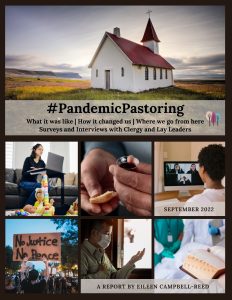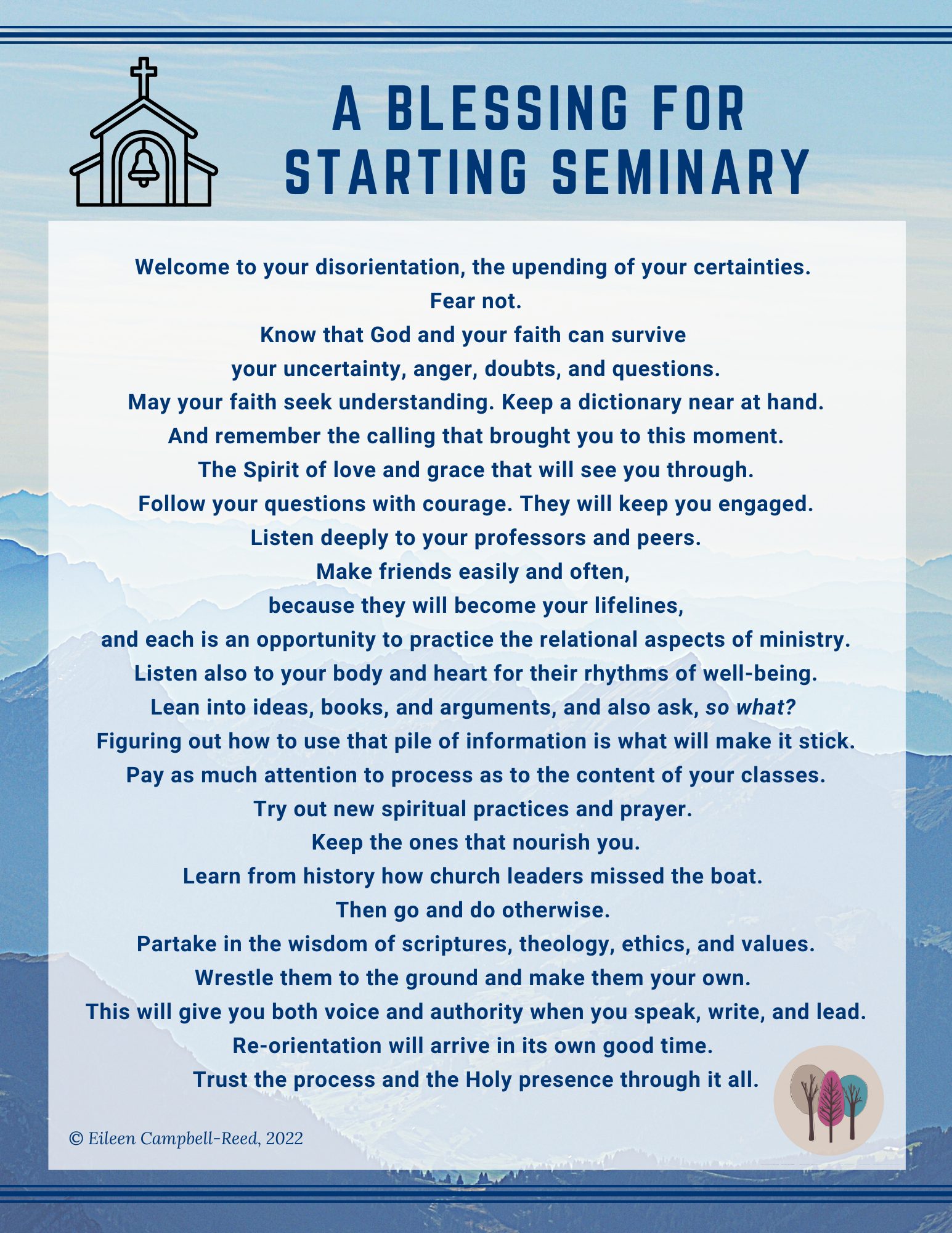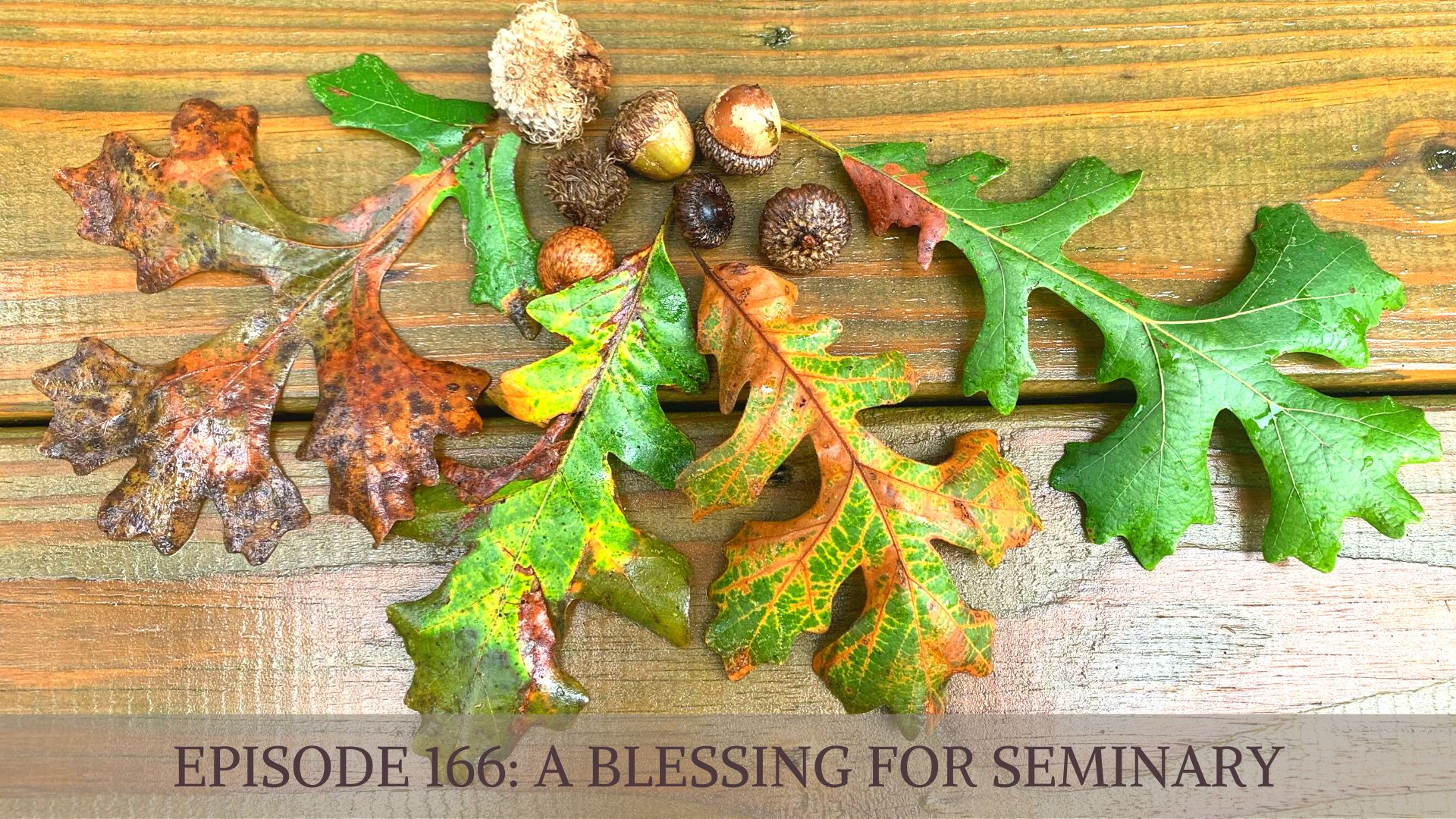Dear seminary student,
Welcome to a new year of intense learning and preparation for the practice of ministry. Perhaps you’re feeling a little nervous? Or maybe it is old hat by now! Either way, I want to offer you a blessing for seminary.
This is a letter to help you get the lay of the land, or to encourage you — wherever you are on the seminary journey. Whether you are an evangelical student in the upper Midwest and hoping to be a pastor, or a Mainline student in the deep South planning to be a chaplain, a bi-vocational minister in a historic Black church seeking more training, a non-denominational seminarian aiming for campus ministry, or a Roman Catholic novice preparing for the priesthood, you have many more things in common than you might believe. And so many of the same things to learn.
How can that be?
Well one of the early and surprising findings of the Learning Pastoral Imagination Project is that becoming a religious leader requires many of the same moments — no matter your theology or region, age or gender, role or previous work. Learning a complex practice like ministry means cultivating an embodied and relational, spiritual an integrative capacity. It can only be learned with time, and while schooling is a great help it is the beginning and not the end.
That capacity, which we call pastoral imagination, is only honed with years of practice. Experience after ministry experience in practice, can open you up to becoming a person who can step into a complex situation, see what is important, urgent, and salient; and know how to respond pastorally. This is not something one figures out overnight. Pastoral imagination deepens and expands with time.
“But I already have experience….”
Right! Maybe seminary is the start of your second or third career? At least you’re already a college graduate. And I can imagine you’re wondering: Do I really want to start again with learning something new? Becoming a student again is like wobbling along on a bike or trying to understand the rules of a new card game. Frustrating, slightly hilarious, occasionally embarrassing, and making you wonder why you said yes!
If you already have a depth of experience in ministry, and seminary is something more like formalizing things you already know and making connections, then you can do the work more intentionally and deliberately. Your path through seminary may have fewer stumbling points. But you also may find yourself wondering: What does all of this have to do with my vocation? Raise your hand when that thought comes up. And kindly ask your professor or teaching fellow to help you make the connections. You’ll be doing them as big a favor as you are for yourself.
Everything you’ll be learning this term and all the terms of seminary can go into a library of experience and knowledge and skill that you will draw on hundreds and thousands of times in the work of ministry. You won’t always have time to think about it. But you have the gift of time right now to think about it deeply. Squander, not.
A New Era of Ministry

To be going to seminary now years after the dawn of a global pandemic, in the midst of an urgent and daunting climate crisis, on a shrinking globe, deeply divided and at war, morally bankrupt, and theologically adrift, means you have been called to lead the church and/or ministries of liberation, justice, and reconciliation, at a profoundly impossible moment in human history. You will need to embrace ministry as a spiritual practice because professionalism will not be enough.
The #PandemicPastoring Report, released in September 2022, details the ways church itself, and the practice of ministry, are embarking on a new era since March 2020.
It takes all kinds
Remember that you will do your work uniquely and particularly — as only you can do it. Remember also that you are learning something universal. Adult human learners experience moments in the learning process that are known by everyone.
So while you want to go your own way, also seek the humility to step back consistently and ask yourself Who can help me with this and who can support me on this learning way? Seek out mentors for particular skills and arts of ministry. Engage them in conversation and ask for their help. Also don’t feel obligated to take advice at every single turn. Note what is offered, and take it under advisement.
Ask your questions and engage your experience
Whether you are taking a course in the Hebrew Bible prophets, the theology of Bonhoeffer, or the womanist ethics of Katie Cannon, you’ll learn more when you bring your own questions. Take note of how much your professors love their subject matter. It is that love that they are teaching you, and their attention to detail, as much as the content of each class or book.
My aim is to teach equal measures of process and content in my courses, and this is sometimes misunderstood or lost on students. They may worry that I’m not being hard hitting enough or taking ideas to their full depth. However, intellectual rigor is only one dimension of seminary education. It is the biggest dimension of doctoral education, and far too many professors forget the distinction. They prioritize their doctoral concerns in the seminary classroom. Which can be perfectly wonderful. As long as they make the connections (or point to the pathway so their students can make connections) about why this beloved subject matters for the work of ministry, the healing of the world, the everyday lives of humans on a fragile planet.
The text and the context both matter. The WHAT and the SO WHAT are crucial. Knowledge acquisition and knowledge use together make the class worth taking. And they put valuable, useful knowledge into the inner library ministers will need to cultivate pastoral imagination.
Embrace the role of novice and beginner
When I have a chance to speak to the students in the weeks and months before they actually plunge into the seminary classroom, I often welcome them to their “disorientation.” Here I am drawing on the work of Walter Bruggemann who writes about Psalms. The Psalter provides a framework useful for understanding the human condition.
The Psalter has verses that address the solid and steady orientation of our lives as we believe them to work. Other Psalms articulate profound ruptures and disorientation, reflecting the brokenness of the human experience. Still other Psalms lead readers and worshipers through the deepest pits of despair and up on a wing of new flight, showing us a world remade on the far side of complexity.
That can be the path of seminary from orientation to life when you arrive, to the disorientation of seminary itself, and the re-orientation that comes with time, experience, and learning. I hope you can find ways to trust that even if it feels like things are falling apart, they will come back together in meaningful new ways. Here’s a blessing for your seminary journey.
A Blessing for Starting Seminary
 Use the form below to receive a printable PDF of A Blessing for Starting Seminary.
Use the form below to receive a printable PDF of A Blessing for Starting Seminary.




